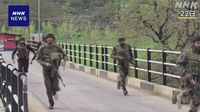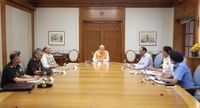On April 30, 2025, tensions between India and Pakistan escalated dramatically as Pakistan's Information Minister, Tarar, announced that credible information suggests India is planning a military attack within the next 24 to 36 hours. This alarming development comes in the wake of a recent terrorist attack in Pahalgam, Kashmir, where 26 people, including tourists, lost their lives. India has accused Pakistan of being involved in this attack, a claim Pakistan vehemently denies, seeking a neutral investigation instead.
Tarar's statement, posted on X (formerly Twitter), warned that any act of aggression from India would be met with a decisive response from Pakistan. "We have credible information that India is planning a military attack under the pretext of the Pahalgam incident," he stated. "If India initiates any acts of aggression, the responsibility for the serious consequences will rest entirely with them." This assertion underscores the heightened atmosphere of fear and uncertainty in the region.
The backdrop to this escalation is the tragic event that unfolded on April 22, 2025, when armed assailants targeted tourists in the Indian-controlled area of Kashmir. India has since closed border checkpoints, citing Pakistan's alleged support for terrorism as justification for these measures. In retaliation, Pakistan halted trade with India, further straining the already tenuous relationship between the two nuclear-armed neighbors.
On April 28, 2025, Pakistan's Defense Minister, Asif, echoed Tarar's sentiments in a Reuters interview, indicating that a military invasion by India was imminent. He emphasized that Pakistan is on high alert and would only consider using nuclear weapons if there were a direct threat to its existence. This statement reflects the dire stakes involved, as both nations possess significant nuclear arsenals.
In India, the government is preparing for potential military action. Reports from various Indian media outlets have revealed that Prime Minister Modi granted the military complete freedom to determine the timing and methods of any retaliatory actions during a meeting on April 29, 2025. This meeting included key military officials and Defense Minister Singh, indicating a serious commitment to responding to perceived threats.
The situation has drawn international attention, with the U.S. State Department expressing concern over the rising tensions. U.S. State Department spokesperson Bruce announced that Secretary of State Rubio would engage in telephone discussions with the foreign ministers of both India and Pakistan to address the escalating crisis. He urged leaders from other countries to intervene and promote dialogue between the two nations.
As the clock ticks down on the timeline suggested by Pakistan’s government, the world watches closely. The implications of a military conflict between India and Pakistan are profound, given their history of hostilities, including several wars and ongoing skirmishes over the Kashmir region. The international community remains hopeful that diplomatic efforts can avert a potential disaster.
The Kashmir conflict has long been a flashpoint between the two nations, with both sides claiming the region as their own. The Indian government has consistently accused Pakistan of supporting terrorist groups that operate within its borders, while Pakistan counters that India has fabricated these claims to justify its aggressive posture.
In the aftermath of the Pahalgam attack, Indian officials have reiterated their stance that Pakistan must be held accountable for its alleged support of terrorism. The Indian government’s closure of border checkpoints and the suspension of trade are seen as necessary measures to safeguard national security, but they have also exacerbated tensions.
On the ground, the civilian population remains caught in the crossfire of this geopolitical struggle. The fear of military action looms large, with families on both sides of the border anxiously awaiting news. As military movements are reported and diplomatic channels remain strained, the situation grows increasingly precarious.
In conclusion, the coming hours are critical for both India and Pakistan. With military action threatened, the need for calm and diplomatic dialogue has never been more urgent. As leaders on both sides prepare for possible confrontation, the hope remains that cooler heads will prevail, and the path to peace can be found amidst the rising tide of conflict.






